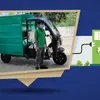This startup is ensuring a self-drive EV for last mile jockeying
inGo Electric, a Bengaluru-based startup, is looking to launch carbon-emission free two-wheelers next month, enabling travel up to 20 km on a single charge or battery swap.
How does one find his or her calling? For Nikhil Gonsalves, it all started with the feeling that he did not want to do a ‘job’ anymore but get into something more meaningful, like “solve the problem of traffic on the road,” Nikhil says.
And thus, , a Bengaluru-based startup, which stands out for its effective electric vehicles and unique designs, was launched. The startup has bagged several awards and grants from the government, and became one of the top startups to gain attention at the recently held Bengaluru Tech Summit 2020, virtually inaugurated by Prime Minister Narendra Modi.
Nikhil started inGo Electric in 2017 to enable people to ride their last mile on electric vehicles (EV) with light, futuristic, and carbon-emission free two-wheelers. It’s product inGo Tron is going to hit the roads next month, a smart and sustainable commuting device which is also energy efficient and enables travel up to 20 km on a single charge or battery swap.
Software engineer to automotive entrepreneur
Nikhil worked in the corporate sector for more than 14 years, following which he did a company-sponsored management programme at IIM Bangalore in 2016. “After its completion I did not want to join work again,” laughs Nikhil. When he was deliberating on ideas for a venture, he often heard of the pains of Bengaluru traffic. He started researching on countries with less road traffic and found that a good public transport system made all the difference. He further realised that a lot of people in India do not use public transport because of insufficient last-mile connectivity.

Nikhil Gonsalves, Founder, inGo Electric
In 2016, when EV was just a buzz word, Nikhil decided to venture into this space. “It is the future of mobility,” says Nikhil. By 2017, Nikhil had inGo on the go and incubators and government supporting him. The founder also says that unlike many other EV players in India, he is not buying the devices from China and selling them here, but rather building it from scratch.
Market and differentiation
The electric vehicle market is likely to be a Rs 50,000-crore opportunity in India by 2025, with two and three-wheelers expected to drive higher electrification of the vehicles in the medium term in the wake of COVID-19, according to a report by Avendus Capital, the investment banking arm of financial services provider Avendus Group.
The report also said that the total cost of ownership (TCO) in case of low and medium-speed electric two-wheelers is already lower than internal combustion engine vehicles. According to the report, with the present and projected level of EV penetration in the country, EVs in India could represent a Rs 500-billion opportunity by 2025. Two and three-wheelers will lead the electrification movement in India in the medium term.

Speaking about the market and competition, Nikhil said efficiency will help keep them going and the fact that these vehicles are made locally. inGo’s product has been a result of a lot of hard work, genuine intent, innovation, and engineering, which Nikhil says, lacks in the EV space in India. Going forward, Nikhil hopes to reduce the dependency on China and Taiwan for components. “China controls more than 80 percent of EV components, that needs to change,” says Nikhil.
Powerpack team
inGo electric has a lean but strong team of 15 people with four key executives including Manjunath Panthangi, ex-President – Bosch R&D Automobiles; Ramani Iyer, Co-founder and Spykke, ex-Mercedes Benz executive Arjun Kashi, and founder of an erstwhile automotive startup, Prasanth Krishna.
Sharing a funny incident, Nikhil says that when he was looking for investors, he visited about a hundred of them, but Ramani Iyer, who invested in his personal capacity in the company, lived just five minutes away from his house. After meeting with Ramani, he agreed to invest in a matter of a few minutes, adds Nikhil.

Manjunath Panthangi, Chairman, inGo Electric, and Ex-President – Bosch R&D Automobiles
Funding and business
Bengaluru-based inGo has raised total funding to the tune of Rs 3.5 crore, which comes in tranches from various grants, awards, and funding deals. Besides being part of Startup Karnataka, inGo has been incubated at Bosch and IIM Bangalore. Nikhil says that it will raise the next round of funding once it has 200 customers and a valuation to flaunt. At the moment, it has seven clients, and is profitable at a unit level.
Business model
inGo is currently a B2B company with clients like Evolve Back resorts, Grabbngo (service providers at Mumbai and Delhi Airport), Prestige properties, and some others who are looking at this mode of transport for neighbourhood deliveries. Nikhil says that the startup will add more revenue streams, and plans to go B2C in the near future, sell EV components, and will also enable riders or auto companies to turn a diesel/petrol two-wheeler into an EV.
Edited by Anju Narayanan










